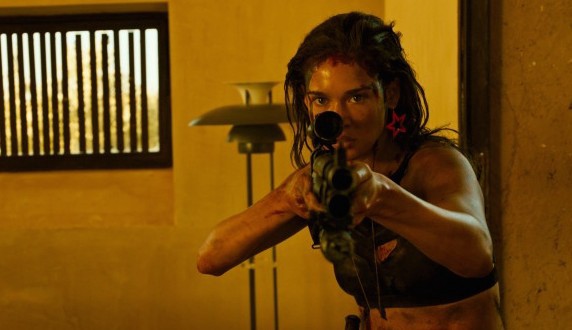Coralie Fargeat began her career as an assistant director on American productions in her native France. Her debut short film “The Telegram” won 13 awards at multiple film festivals, and her sci-fi short “Reality+” has won multiple awards on the festival circuit. The latter made its U.S. premiere in competition at the Tribeca Film Festival in 2016. “Revenge” is Fargeat’s first feature film.
“Revenge” will premiere at the 2018 Sundance Film Festival on January 19.
W&H: Describe the film for us in your own words.
CF: A revenge movie somewhere between “Kill Bill” and Lara Croft!
W&H: What drew you to this story?
CF: The urge to make my first feature. The desire to make a real genre film. The need to express my universe as a director, with no compromise. And the will to express my concern about feminism in a very symbolic way.
W&H: What do you want people to think about when they are leaving the theater?
CF: Women kick ass! The old world is over!
W&H: What was the biggest challenge in making the film?
CF: Everything! From day one until the end of post-production, it has really been an everyday fight to get the film done and to get my ambitions on screen. From the moment I wrote the first line of the script, I entered a guerrilla mode to make it happen!
W&H: How did you get your film funded? Share some insights into how you got the film made.
CF: The film — which is an independent movie — was financed in France by independent funds. The road was not easy but I never gave up and I kept believing in the film even in the worst moments. Like with my and “Revenge’s” heroine, I had to go until the end; there was no turning back!
W&H: What does it mean for you to have your film play at Sundance?
CF: It’s a huge achievement as a filmmaker and a sign that the theme of the film resonates powerfully everywhere!
W&H: What’s the best and worst advice you’ve received?
CF: I only remember good advice! Which would be: “Trust your instinct and never give up.”
W&H: What advice do you have for other female directors?
CF: Trust your instinct and never give up!
W&H: Name your favorite woman-directed film and why.
CF: “Polisse” from Maïwenn. The movie was a shock when I saw it, and it still powerfully resonates with me.
W&H: Hollywood is in the midst of undergoing a major transformation. Many women and some men in the industry are speaking publicly about their experiences of being assaulted and harassed. What do you think of the recently announced anti-sexual harassment Commission made up of industry leaders? Do you believe that it will help make systemic change? What do you think needs to be done to address this issue?
CF: There is still a lot to do to change mentalities that will guarantee women’s safety and equality. We need to stay focused on the topic and keep being proactive until we get everything done, which means until we get absolute equality, and parity, in salaries, decision making, opportunities, and so on.
For me, a major thing that needs to be done so that things can deeply change in the industry — and elsewhere as well — is to have more women in positions of power, and I mean real power: among financiers, studios execs, agents, producers. We need parity — real parity, real decision makers, everywhere.







